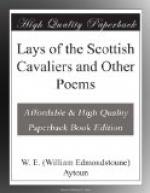With a force which, at the battle of Preston, did not double the above numbers, the Prince descended upon the Lowlands, having baffled the attempts of General Cope to intercept his march—occupied the city of Perth and the town of Dundee, and finally, after a faint show of resistance on the part of the burghers, took possession of the ancient capital of Scotland, and once more established a court in the halls of Holyrood. His youth, his gallantry, and the grace and beauty of his person, added to a most winning and affable address, acquired for him the sympathy of many who, from political motives, abstained from becoming his adherents. Possibly certain feelings of nationality, which no deliberate views of civil or religious policy could altogether extirpate, led such men to regard, with a sensation akin to pride, the spectacle of a prince descended from the long line of Scottish kings, again occupying his ancestral seat, and restoring to their country, which had been utterly neglected by the new dynasty, a portion of its former state. No doubt a sense of pity for the probable fate of one so young and chivalrous was often present to their minds, for they had thorough confidence in the intrepidity of the regular troops, and in the capacity of their commander; and they never for a moment supposed that these could be successfully encountered by a raw levy of undisciplined Highlanders, ill-armed and worse equipped, and without the support of any artillery.
The issue of the battle of Prestonpans struck Edinburgh with amazement. In point of numbers the two armies were nearly equal, but in every thing else, save personal valour, the royal troops had the advantage. And yet, in four minutes—for the battle is said not to have lasted longer—the Highlanders having only made one terrific and impetuous charge—the rout of the regulars was general. The infantry was broken and cut to pieces; the dragoons, who behaved shamefully on the occasion, turned bridle and fled, without having once crossed swords with the enemy. Mr. Chambers thus terminates his account of the action: “The general result of the battle of Preston may be stated as having been the total overthrow and almost entire destruction of the royal army. Most of the infantry, falling upon the park walls of Preston, were there huddled together, without the power of resistance, into a confused drove, and had either to surrender or to be cut to pieces. Many, in vainly attempting to climb over the walls, fell an easy prey to the ruthless claymore. Nearly 400, it is said, were thus slain, 700 taken, while only about 170 in all succeeded in effecting their escape.




